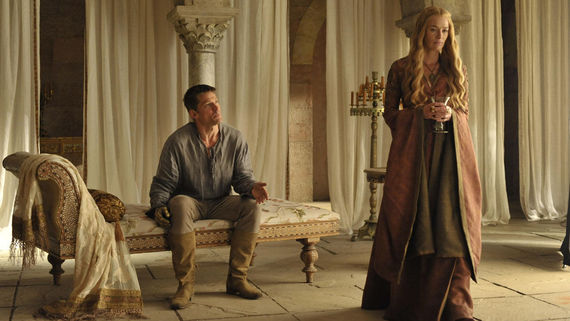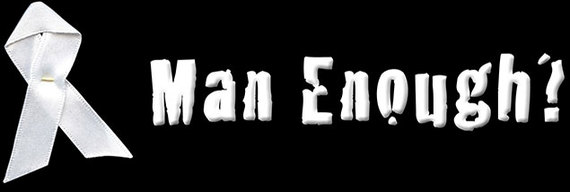Feminists this week have been writing furiously about the representation of rape in the HBO series Game of Thrones, specifically that creepy scene (*spoiler alert*) in Episode 3, involving a brother-sister rape next to the corpse of their incest-born son.
A rape survivor myself, I wasn't so furious. In fact, I found it telling that Cersei Lannister -- arguably the most powerful woman in the fantasy kingdom of Westeros -- could still be subjected to rape at the hand(s) of her own brother and former lover. (Reason No. 57 why the Lannisters are the worst family in Westeros.) Personally, I think that's a potent statement from the show's creators, reminding us that sexual assault can affect anyone regardless of how high you sit in a fictional society or in the real world.
What I did find odd is that journalists seemed more eager to discuss the complexities of a fictional rape than one involving real people. Laura Hudson on Wired.com exposed the unwillingness of the episode's director to see the scene as rape. On Salon.com, Roxane Gay's article "Game of Thrones Glamorizes Rape" cited this as another example of TV using rape as a narrative device, "used to create drama and ratchet up ratings." Sonia Saraiya on The A.V. Club similarly considered the frequent depiction of rape on the television show as a turn towards misogyny. For her, Game of Thrones uses female nudity and sex (both consensual and non-consensual) to draw in male viewers, with little regard for the ethical implications.
These are all interesting arguments, and as both a film producer and a rape survivor, I certainly have my views on the representation of rape in popular culture (which I'll explore in the weeks to come). But today, I'd rather link this recent debate about a fictional rape with things that have been happening in the real world.
The above journalists imply that by portraying rape so frequently as a narrative device, television desensitizes viewers (specifically male viewers) to the emotional horror of rape and the devastating impact it can have on victims. Rape is no longer a real crime; it becomes the stuff of fiction. Whether or not this desensitization happens, I do believe there is vacuum of open public discussion about rape as a real experience and a real crime. We know feminists and rape survivors will always be concerned about issues of sexual assault. The main question is: can we get the rest of the people in society out there to care about the issue? More importantly, can we get unaffected men to care about the issue?
A few days before Episode 3 of Game of Thrones aired, Tom Meagher's compelling article ran in The Guardian. A widower whose wife had been raped and murdered in Australia by a convicted serial rapist on parole, Meagher argued against the myth of seeing all rapists as monsters.
This is something I very much agree with. My own assault in 2008 was by a 15-year-old stranger who followed me in a park. When I was interviewed on the radio some years later, a BBC journalist referred to a psychological report on my convicted assailant and repeatedly asked me: "Is he a monster?"
I could sense that journalist's hunger for a sensationalized headline: "Rape Victim Calls Her Rapist a Monster." But frankly, I don't think we should be using that word for anyone, regardless of what their actions are.
Last time I checked, we weren't living in a sci-fi/fantasy world. Our world is populated by human beings, not monsters. A number of psychological and sociological factors can lead to a human committing monstrous crimes. But to say that a rapist is, by nature, a monster is denying the accountability of our own society in encouraging boys to become rapists, in ignoring the seriousness of rape and allowing it to be committed again and again -- and never really addressed.
Not all rapists are lurking strangers like my own attacker or the man who killed Jill Meagher. In fact, most rapists are someone the victim knows -- a colleague, a supposed friend, or -- as Game of Thrones has just reminded us -- even your former lover or brother. By failing to acknowledge the familiarity of our rapists, by obscuring the facts with the popular myth of the outcast monster, we are hampering our own ability to address the issue.
Meagher headlines the Ireland chapter of the White Ribbon Campaign, "the world's largest men's organization dedicated to combating harmful social norms that perpetuate men's violence against women." I believe one of the most harmful social norms is the male unwillingness to discuss rape. While the majority of men respect the notion of sexual consent, too many are embarrassed to talk about rape. The word itself seems to kill conversation. Filmmaker Jessie Kahnweiler, in her article this week, described how her dating life has suffered since her short film "Meet My Rapist." Men react strangely to her identity as a rape victim and avoid approaching her sexually. But what would have been her other option -- to keep quiet about it and perpetuate the silence? To bring in the Game of Thrones debate, is it a problem that men constantly see dramatized rape scenes on screen, and yet so few can discuss the reality of rape when it affects people they actually know?
My own male friends had a range of reactions to the news of my rape. Some were immediately supportive. Others froze up and took weeks to say anything to me. And many were also full of anger towards my attacker, even expressing hopes that he himself would be raped in prison. Tom Meagher heard similar sentiments directed towards his wife's murderer, yet he argues for a more nuanced view of the issue. Rape is not a form of punishment. And further violence is not the answer. That's not a response they would like in Westeros, but then again, this is the real world. And our world is populated by human beings.

